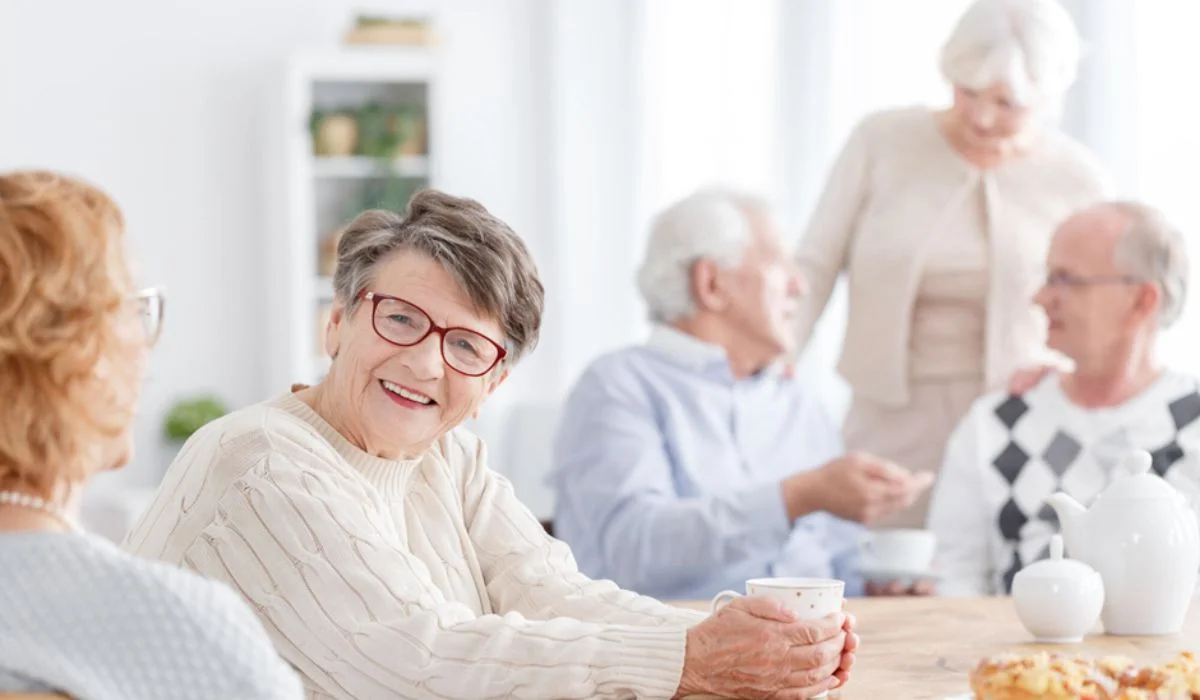GENERAL
8 Reasons Why Social Time is Essential for Elders in Senior Facilities

Have you ever thought about why social time is important for older adults in senior centers? Many think seniors are happy with their routines, but social interaction is key to their well-being. How does social time affect their lives, and why is it important?
In this blog post, we’ll explore eight compelling reasons why social time is essential for elders in senior facilities. By the end, you’ll understand how fostering social connections can significantly enhance their quality of life. Read on!
1. Enhances Mental Health
Social interactions are really important for seniors’ mental health. They help people feel like they belong and have a purpose. Spending time with friends can reduce feelings of loneliness and sadness, leading to a happier life.
Reduces Feelings of Loneliness
Social time is important because it helps people feel less lonely. Many older adults in retirement homes can feel alone.
Regularly spending time with others gives them friends and support. Being around people can make them happier and help them feel like they belong, which is important for their mental health.
Boosts Emotional Well-Being
Social activities give us emotional support and happiness. Spending time with friends and joining group activities can boost our mood.
This positive effect is important for mental health and can help reduce depression and anxiety. Social time helps elders feel valued and connected.
2. Supports Cognitive Function
Cognitive function is vital for maintaining independence and a high quality of life as we age. Engaging in social activities not only stimulates the mind but also promotes mental agility, making it an essential component of cognitive health for seniors in facilities.
Stimulates Mental Engagement
Social time is when we talk, play games, and do fun activities that keep our minds busy. These things are great for our brains and can help slow down thinking problems as we get older.
Having good conversations and solving puzzles keeps our minds active. Meeting with friends often can make our brains healthier!
Reduces the Risk of Cognitive Decline
Socially active seniors are less likely to have serious memory issues. Being social can help improve memory and thinking.
By joining fun activities, older adults can keep their brains healthy for a longer time. This good approach also supports their mental health.
3. Encourages Physical Activity
Social time often means doing activities like group exercises, dancing, or walking with friends. These help you stay active, which is important for your health.
Regular movement keeps you mobile, strong, and fit. Social activities that include movement boost your well-being.
Enhances Overall Physical Health
Adding social time to your daily routine helps you stay active and improves your physical health. Joining group activities can help you manage your weight, keep your heart healthy, and give you more energy. When you socialize, you’re likely to make healthier choices, which is great for your overall well-being.
4. Strengthens Relationships
Spending time with others helps us make friends and build strong relationships. When we connect with people, we create a support system of friends and acquaintances.
These connections make us feel like we belong to a community. For seniors, having a close group of friends is important for emotional support and companionship.
Encourages Mutual Support
Strong relationships formed during social time often lead to mutual support among peers. Friends in senior facilities can offer emotional and practical support to each other.
This network of support enhances the overall quality of life and provides comfort during challenging times. Building and maintaining these relationships are essential for a fulfilling experience in senior independent living.
5. Boosts Self-Esteem and Confidence
Joining social activities can help boost self-esteem and confidence. When older adults take part in group projects, hobbies, or events, they can show off their skills and talents. T
his feeling of achievement makes them feel good about themselves and promotes a positive attitude. Feeling appreciated and successful helps build personal confidence.
Encourages Positive Self-Image
Social interactions help improve how seniors view themselves. Being active in social settings reinforces their sense of identity and purpose.
Positive reinforcement from friends and peers boosts their self-image and helps them feel appreciated. This enhanced self-image is crucial for maintaining a positive attitude and mental health.
6. Provides Emotional and Psychological Benefits
Spending time with friends is important for feeling good and happy. Talking about our feelings and sharing experiences helps us feel better and understood. This support makes it easier to deal with tough emotions and keeps us mentally healthy.
Helps Manage Stress
Engaging in social activities can help manage stress levels. Conversations and interactions with friends act as a distraction from stressors and provide a sense of relaxation. Social support helps in mitigating the impact of stress and promotes a more relaxed and balanced state of mind.
7. Facilitates Social Skills Maintenance
Spending time with others helps older people keep their talking skills sharp. Regular chats and interactions make sure they stay engaged. Keeping these skills is important for staying social and communicating well with others.
Promotes Social Adaptability
Joining different social activities helps older adults get used to various social situations. It makes them more comfortable interacting with others, which improves their social skills. Being able to adapt and connect positively in different scenarios is good for their overall happiness and well-being.
8. Fosters a Sense of Purpose
Social time often involves activities where elders can contribute and make a difference. This sense of purpose is vital for maintaining motivation and enthusiasm. Being involved in community activities or helping others gives them a meaningful role and a reason to engage actively.
Enhances Overall Life Satisfaction
Regular social interactions and chances to help others can make you happier in life. When you feel connected and have a purpose, life becomes more fulfilling. Spending time with others adds joy and meaning to your everyday routine.
The Essential Role of Social Time for Elders in Senior Facilities
In summary, spending time with others is important for seniors in care homes. It helps with their mental health, brain function, and overall physical health. By fostering relationships and providing emotional support, social interactions enhance self-esteem and overall life satisfaction.
Prioritizing social time allows elders to lead richer, more fulfilling lives. Regular opportunities for connection not only improve their quality of life but also contribute to their happiness. Explore our website for more insights on the importance of social engagement!
GENERAL
Promoting Respectful and Safe Motorcycle Interactions with Other Road Users

Riding a motorcycle on the open road is an amazing feeling. It’s like nothing else – you feel free, excited, and connected to everything around you. But it’s important to remember that you’re not the only one out there. Cars, trucks, bikes, and people walking are all sharing the road with you. That’s where motorcycle etiquette comes in.
Motorcycle etiquette isn’t just about being polite; it’s about keeping everyone safe and showing respect for others on the road. By following some important rules, motorcyclists can make the roads safer and more friendly for everyone.
Following the Rules of the Road
The first important part of motorcycle etiquette is the same as it is for any driver: following the rules of the road. That means sticking to speed limits, obeying traffic lights, and staying in your lane. It might sound obvious, but unfortunately, some motorcyclists think they don’t have to follow these rules. But breaking the rules not only puts them in danger, but it also makes other drivers think badly of motorcyclists. Riding responsibly means respecting the law and making sure you ride safely.
Besides following traffic laws, responsible motorcyclists make sure they have the right license and that their bikes are registered. This shows they’ve had the proper training and that their bikes are safe. It’s also good to know any special rules for motorcycles in your area.
The Power of Visibility and Predictability
Motorcyclists can be hard to see on the road because they’re smaller than cars and trucks. This means they can easily get lost in blind spots. That’s why motorcycle etiquette says it’s really important to make sure you’re as visible as possible.
Wearing gear that’s easy to see is key. Reflective vests or jackets make a big difference, especially when it’s dark out. Try to wear bright-colored helmets and clothes whenever you can. Even something simple like a bright scarf blowing in the wind can help. The idea is to make sure other drivers see you well before they get too close.
Visibility isn’t just about color. Motorcycle etiquette also says you should keep your headlight on during the day. Even though it seems small, this makes a big difference in how noticeable your motorcycle is, especially compared to other vehicles with their daytime lights.
Being predictable is also really important. Motorcycle etiquette says you should use your turn signals well before you change lanes or turn. Sudden moves can confuse other drivers and cause accidents. And make sure to keep a safe distance from the car in front of you. This gives you time to react if they suddenly stop, and it stops you from making them feel rushed.
Sharing the Road for a Smooth Ride
The heart of motorcycle etiquette is all about being polite and thoughtful to everyone else on the road. Defensive riding is a big part of this. According to a motorcycle accident lawyer in Seattle, this means you should always be ready for other drivers to not see you and be ready for any dangers that might come up. So, don’t do things like weaving between cars or driving too close behind someone. These actions not only put you in danger but also make things tense for other drivers.
The motorcycle wave is another way to show good manners while riding (as long as it’s safe to do so). It’s a simple way to say hi to other riders and make the road feel friendlier. But safety is the most important thing. If the road is rough, the weather’s bad, or there’s a lot of traffic, it’s totally okay to keep both hands on the handlebars.
Looking Out for Your Fellow Riders
For people who like riding in groups, motorcycle etiquette becomes even more important. Hand signals become really useful for showing things like hazards or when you’re going to turn, especially if it’s hard to talk because of the noise. Riding in a staggered formation, where riders are a bit apart from each other in the lane, makes it easier for the group and other drivers to see everyone.
In the end, taking care of each other while riding is just part of being polite on a motorcycle. It’s about making sure everyone feels like they’re part of a group and that everyone stays safe and has a good time.
Motorcycle riding etiquette isn’t just about what motorcyclists do—it’s about everyone on the road working together. When motorcyclists follow these rules, they can help make things better for everyone. It makes motorcyclists look good, lowers the chances of accidents, and makes the road more fun for everyone. Just remember, we all share the road, so being polite and considerate can make a big difference in keeping everyone safe and making the trip smoother.
GENERAL
The Influence of Urbanization on Contemporary Living Space

Have you noticed how cities are changing how we live?
Urbanization transforms our living spaces in big ways. It affects everything from house sizes to the green spaces around us. In cities, we see more apartments and fewer big yards. This change impacts how we play, relax, and come together.
Keep reading to discover how urbanization affects contemporary living spaces. Join the conversation on the future of urban living.
Green Spaces Redefined
In cities, parks and green spaces are more than just places to look at. They’re where people go to exercise, relax, and have fun with friends and family. But as cities grow, these areas have to change too.
One cool trend is making rooftops into gardens. People can also find small gardens sandwiched between buildings. These spots bring a bit of nature into the busy city life, giving us fresh air and a place to unwind.
Community Living Boost
Urban life has a unique way of bringing people together. Instead of big houses with huge backyards, many city dwellers live in futuristic apartments. This setup makes community areas very important.
Certain places become hotspots for meeting and hanging out with neighbors. Examples are playgrounds, shared gardens, and community centers.
Think of it as living in a close-knit neighborhood where everyone knows each other. It’s all about sharing spaces and experiences, creating a strong sense of togetherness among city residents.
Innovative Housing Designs
Innovative housing designs are popping up to meet the needs of city folks. Imagine living in a contemporary apartment where every inch is smartly used. That’s what these new homes are all about.
For example, Blackbird Farms Apartments show how modern living fits perfectly in urban areas. They have cool features like space-saving designs and community areas for everyone to enjoy.
It’s all about making the most out of living in the city. There, space is precious, and being close to your neighbors is part of the fun.
Enhanced Public Transport
With more people living in cities, it’s important to have good ways to get around. Public transport is a big help here. It means buses, trains, and sometimes trams that take us where we need to go, without everyone having to drive a car.
This is great because it can be cheaper and faster, especially during busy times when the roads are full. Plus, it’s better for the planet since it cuts down on pollution from cars.
Cities are working to make public transport better and more convenient for everyone. This way, it’s easier for people to travel to work, school, and fun places without hassle.
Technology-Enabled Smart Homes
In cities, homes are getting smarter thanks to technology. This means you can control lights, heating, and even locks with a phone or computer.
This makes life easier and safer. It also saves energy, helping the planet. Smart homes use gadgets to talk to each other, making daily tasks simpler.
With these advancements, city living has become more comfortable and convenient. It shows how smart technology positively impacts our lives.
Contemporary Living Spaces and Urbanization
Cities are changing our homes and how we live in big ways. Because of urbanization, our living spaces today, also known as contemporary living, look very different.
We have smaller houses and less green around. But, we are also finding new ways to make our cities better places to live. It’s exciting to think about how we will live in the future!
Did you learn something new from this article? For more tips and guides, keep checking out our blog!
GENERAL
Understanding the Differences: Solar Builders License vs Solar Contractors License

The solar industry is booming, driven by increasing environmental awareness and the need for sustainable energy solutions. As demand for solar panel installation grows, so does the need for qualified professionals to carry out these projects.
Two common licenses required in the solar industry are the Solar Builders License and the Solar Contractors License. While they may sound similar, there are distinct differences between the two that individuals aspiring to work in the solar sector should understand.
In this article, we’ll delve into the specifics of solar builders license vs solar contractors license, their requirements, and their roles in the solar industry, shedding light on the differences and helping you make an informed decision about which path to pursue.
What is a Solar Builders License?
A Solar Builders License is a credential. It allows people to build and install solar energy systems. Builders with this license are responsible for the physical parts of solar projects. They mount panels, connect wiring, and ensure structural integrity. They typically work on-site, performing hands-on tasks to bring solar energy systems to life.
Requirements for Obtaining a Solar Builders License
To get a Solar Builders License, individuals must meet requirements set by their state or local jurisdiction. These requirements may include:
Education and Training
Many places need applicants to finish specific solar energy and construction education or training programs. These programs often cover topics. They include electrical wiring, safety, and solar panel installation. Some states or cities may also need individuals to pass a written exam. They must do this before getting their license.
Experience
In addition to education and training, many places also need applicants to have experience. This can range from a few years of general construction experience to specific, hands-on work with solar systems. Some places may also require individuals to give references from past employers. They need the references as proof of their experience.
Examination
In some cases, applicants may need to pass an exam. The exam shows their understanding of solar systems, building methods, and regulations. This examination assesses their readiness to work as solar builders.
What is a Solar Contractors License?
A Solar Contractors License is different. It allows people or companies to oversee and manage solar projects. Contractors with this license plan, coordinate and supervise solar installs. They are responsible for this. They often work behind the scenes and talk with clients, get permits, and make sure projects meet rules.
Requirements for Obtaining a Solar Contractors License
The requirements for getting a Solar Contractors License are usually more thorough. They are more so than for a Solar Builders License. They may include:
Business Entity
In many places, applicants for a Solar Contractors License must run a business. This rule ensures that contractors have the needed legal structure. They can be:
- sole proprietorship
- partnership
- corporation
Remember that contractor license requirements by state vary, so when looking for a solar panel installation in Spokane, make sure to choose a contractor with a valid business entity.
Financial Responsibility
Applicants may need to show financial responsibility, such as proof of or a surety bond. This rule helps protect clients. It also ensures that contractors have the resources to finish projects and handle any liabilities.
Qualifying Individual
In some places, a contracting business must have a “qualifying individual.” This person must meet certain qualifications. For example, they need a specified education or experience in solar. This person oversees the company’s solar projects. They also ensure compliance with regulations.
Continuing Education
Many states require solar contractors to take continuing education courses. They need them to keep their licenses. The courses help keep contractors up-to-date on changes in tech and rules. This ensures they provide the most current and efficient services to clients.
Key Differences Between Solar Builders License and Solar Contractors License
Both the Solar Builders License and the Solar Contractors License are essential for solar projects. But, they are different and have distinct duties. Here are some key differences between solar builders license vs solar contractors license:
Hands-On vs. Management
A Solar Builders License is for people who like hands-on work. They enjoy the physical parts of construction. Builders with this license spend their time on-site, installing solar panels and related equipment.
In contrast, a Solar Contractors License is more focused on management and oversight. Contractors with this license handle the administrative tasks in solar projects. This work includes project planning, budgeting, and client communication.
Scope of Work
Builders with a Solar Builders License mainly install and build solar projects. They ensure that solar panels are well-mounted. The wiring is correctly installed. And all components are securely in place.
Contractors with a Solar Contractors License, on the other hand, have a broader scope of work. They oversee the whole project from start to finish. This includes planning, getting permits, managing subcontractors, and controlling quality.
Legal Requirements
The requirements for getting a Solar Builders License focus on technical skills. They also focus on experience in construction and solar installation. In contrast, the requirements for a Solar Contractors License are often more complex.
They include extra legal and financial parts, like registering a business entity, , and bonding. Contractors must also ensure compliance with licensing regulations and building codes.
Recognizing The Unique Roles Of Solar Builders License Vs Solar Contractors License
In a nutshell, knowing the differences and similarities between a solar builders license vs solar contractors license is key for nailing solar energy projects. They each bring something different to the table. Builders rock the hands-on side of solar installation, and contractors slay it in project management.
Knowing the differences between these licenses is important. It’s a big deal for those getting into solar work and for clients looking for top-notch pros for solar panel projects in Spokane or beyond. By picking the right path and getting the right license, folks can help the solar energy game grow. They will ensure top-notch quality and safety in solar setups for years to come.
Don’t stop your journey here! Dive deeper into our wealth of resources by exploring more articles on our blog.

 HOME IMPROVEMENT11 months ago
HOME IMPROVEMENT11 months agoThe Do’s and Don’ts of Renting Rubbish Bins for Your Next Renovation

 BUSINESS12 months ago
BUSINESS12 months agoExploring the Benefits of Commercial Printing

 BUSINESS12 months ago
BUSINESS12 months agoBrand Visibility with Imprint Now and Custom Poly Mailers

 HEALTH8 months ago
HEALTH8 months agoThe Surprising Benefits of Weight Loss Peptides You Need to Know

 HEALTH7 months ago
HEALTH7 months agoYour Guide to Shedding Pounds in the Digital Age

 TECHNOLOGY10 months ago
TECHNOLOGY10 months agoDizipal 608: The Tech Revolution Redefined

 HOME IMPROVEMENT7 months ago
HOME IMPROVEMENT7 months agoGet Your Grout to Gleam With These Easy-To-Follow Tips

 HEALTH11 months ago
HEALTH11 months agoHappy Hippo Kratom Reviews: Read Before You Buy!









